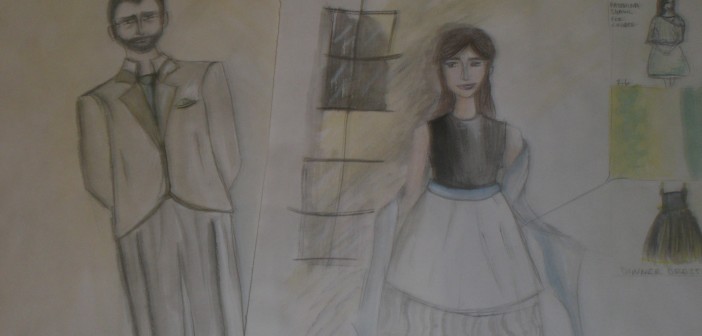Starting winter term, North Central College will be offering a new course in costume design (THE 285), which will give students a glimpse into what goes on behind the scenes of a theatrical production. Elizabeth “Lizzie” Bracken, assistant professor of theater, will be teaching the course.
Costume design is the most personal aspect of design. It challenges designers to create garments that not only reflect the ideas and goals of the production, but simultaneously shape and express who the character is.
Bracken states, “the costume designer is the person who will read the script, talk to the director, meet with the actors and figure out exactly what each of those articles of clothing should look like, how they should be built, and what they should be made of.”
Professionally speaking, designers would normally work alongside a costume shop in order to build the custom designed garment for each actor and each character. And often times multiple costumes are needed for each actor and each character. However, here at North Central, students will be learning how to construct their own pieces to represent their characters.
The course itself will be focusing on two main topics: how character development relates to the design of a costume and the development of drawing skills.
Students will be “exploring who these people really are when we are telling the story,” says Bracken. “Therefore, how does that inform what they would be wearing, what articles of clothing or how they would represent themselves…[also]how the playwright wants to represent them during the actual performance of a piece,” Bracken explains. “The art is really connected to character.”
Costumes give the audience information on the individual character, the relationship among other characters and on different groups of characters. Consider your own wardrobe for example. Now, think of what you would choose to wear to a job interview, on a first date, to wash the car, or to go to class. What you wear says a great deal about whom you are and what you intend to do. The same goes for on the stage.
The other main aspect to the course focuses on developing students’ drawing skills, specifically in figure and fabric rendering. While this is a more practical side of costume design, it is, nevertheless, important. Designers must be able to show the director and any collaborators what their idea is in a clear and attractive way.
“There will be a lot of time spent drawing figures in different kinds of costumes or different types of fabric…looking at how to represent those with pencil or with watercolors or ink,” says Bracken.
The costume design course will become a part of the new theatrical design and technology major, which has been added this year. Currently, North Central offers courses in scenic design, lighting design and stage management.
Bracken states that, “the other biggest area of theater design is costume design. So there was a little bit of a hole and we wanted to make sure that, at the very least, we allow students to explore those three major areas of design: scenic, lighting and costume. Down the line, we would love to expand more into offering courses in sound design…and maybe even work with the art department for courses in projection design and integrative media because we have a lot of opportunity with that department too. But costume was a big missing piece that we wanted to make sure to offer.”
Bracken came to North Central in 2013, bringing extensive experience of scenic design with the Chicago theater community, mostly as a set designer and occasionally as costume designer. From day one, it was her job to help the theatre department’s chairperson, Carin Silkaitis, develop the proposal for the new major. With it, she needed to figure out what courses were missing and would support this new major. Costume design was the very first class Bracken wanted to add to the major.
“I think that everyone agreed that ‘If we’re going to do this major, we really need to have costume design; it’s a very key element,’” Bracken says. “So right off the bat, it was an important step we wanted to take.”
Whether you are a theater major or not, Bracken says that students should expect an “interesting exploration of both drawing as an art and theater as analysis of character.”
If you are interested in this course, no matter what your major may be, contact Professor Bracken at edbracken@noctrl.edu.

